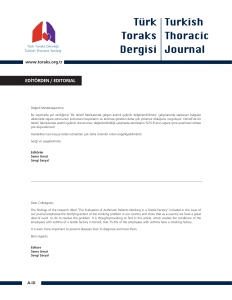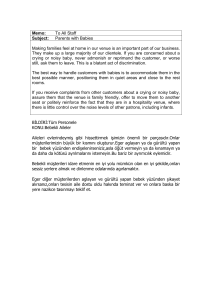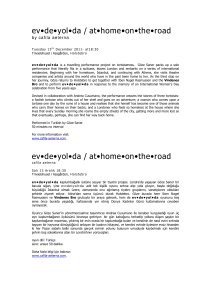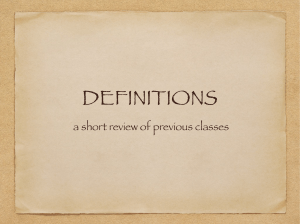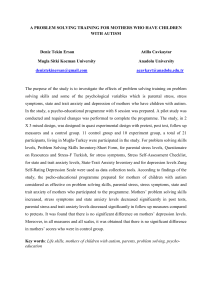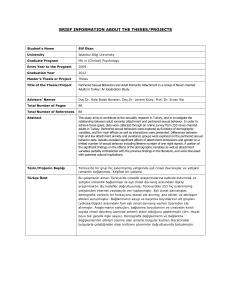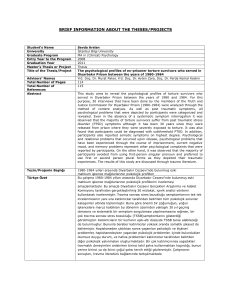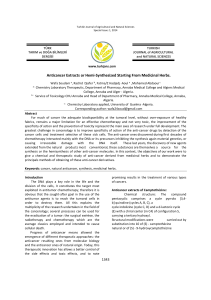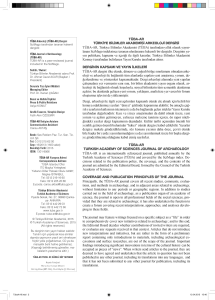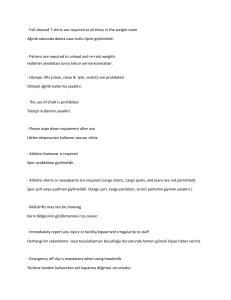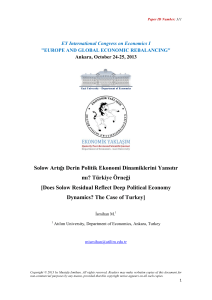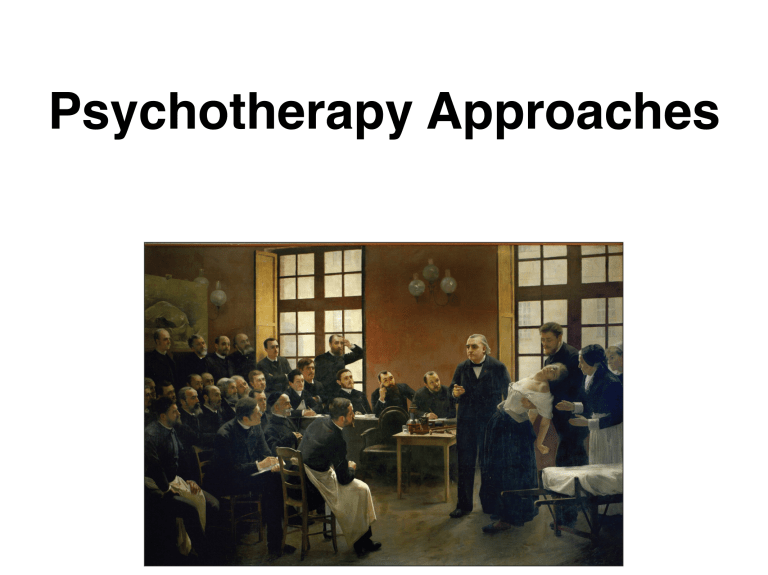
Psychotherapy Approaches
Copyright © 2007 Brooks/Cole, a division of Thomson Learning, Inc.
Questios…
•
What is psychotherapy?
•
Today, How many psychotherapy systems exist?
•
What can be the factors that contribute to change in
psychotherapy?
Growth & Confusion
•
Field of psychotherapy fragmented by future shock &
staggered by over-choice; ≥ 400 systems of
psychotherapy today
•
Developers of systems often claim superior
effectiveness without controlled research
•
Fragmentation & confusion are reduced by a
comparative analysis of psychotherapy systems
•
Comparative analysis requires an understanding of each
systemCopyright
& an©overarching,
integrative
structure
2007 Brooks/Cole, a division
of Thomson Learning,
Inc.
Defining Psychotherapy
The informed & intentional application of
clinical methods & interpersonal stances,
derived from established psychological
principles, for the purpose of assisting
people to modify their behaviors,
cognitions, emotions, &/or other personal
characteristics in directions that the
participants deem desirable.
Copyright © 2007 Brooks/Cole, a division of Thomson Learning, Inc.
Prevalence of Theoretical
Orientations
Copyright © 2007 Brooks/Cole, a division of Thomson Learning, Inc.
Theory
•
In scientific usage, a consistent perspective
on human behaviour, psychopathology, &
mechanisms of therapeutic change
•
Theories describe clinical phenomena, delimit
& organise mass of information, & integrate it
all into knowledge that directs psychotherapy
•
Good clinicians are flexible, & good theories
are widely applicable
Theory_CBT
Her zaman en doğru olanı yapmalıyım.
-meli -malı tarzı düşünce
Hiçbir şeyin doğru düzgün yapamıyorum.
Aşırı genelleme
Annem üzüldüğümü görürse çok üzülecek.
Falcılık, Felaketleştirme
Theory_ST
18 yaşında sevgilisi ile öpüştüğü için hala suçluluk
yaşama
Suçluluk hisleri yüzünde babasını mezarını ziyaret
edememe
Duygularını kimseye göstermeme
Oğluna yeterinde bakım veremediğini düşünme
Kusurluluk, Duyguları bastırma, Yüksek standartlar
Therapeutic Commonalities
Everbody has won and all
must have prizes.
Dodo bird verdict
Alice in Wonderworld
Therapeutic Commonalities
•
Common (nonspecific) factors shared by all
psychotherapies & not specific to any one.
•
Largely neglected by theories as centrally
important, but research suggests they are:
•
Most consensual common factors: client’s
positive expectations & facilitative therapy
relationship
Positive Expectations
• Positive expectations frequently correlate with
positive outcomes
• Responsible for up to 1/3 of successful
psychotherapy • Necessary but not sufficient for treatment
success
• An active, common ingredient in all forms of
psychotherapy
Positive Expectations
Psychotherapy > Placebo > Kontrol group
Therapeutic Relationship
•
12%+ of psychotherapy outcome due to
therapeutic relationship
•
Accounts for second largest proportion of
outcome behind client contribution
•
Its relative importance remains controversial:
range from the essential process of change to
helpful precondition of change
Therapeutic Alliance
Therapeutc alliance according to Bordin (1979):
•
Agreement on the Goals of the treatment
•
Agreement on the tasks
•
Development of a personal bond
Rogers’ Facilitative
Conditions
•Therapist is congruent or genuine
•Therapist relates with (unconditional) positive
regard
•Therapist expresses accurate empathy
Hawthorne Effect
• People improve as a result of having special attention paid
to them
• Psychotherapist gives special, undivided
attention to client
• 50% of public-speaking phobias show improvement
following attention placebo
• Placebo groups are used to control for Hawthorne effect
Specific Factors
• In addition to common factors,
psychotherapies have factors relatively
specific to them
• Psychotherapists cannot practice
“nonspecifically” – they say & do specific
things
• Processes of change are specific or unique
contributions of therapy systems
Processes of Change
A middle level of abstraction between global theories &
specific techniques
Awareness or Insight Therapies: Processes of Change
Consciousness Raising
• Experiential level: Feedback
• Environmental level: Education
Catharsis
• Experiential level: Corrective emotional
experiences
• Environmental level: Dramatic relief
Choosing
• Experiential level: Self-liberation
• Environmental level: Social liberation
Action or Behavioral Therapies: Processes of Change
Conditional Stimuli
• Experiential level: Counterconditioning
• Environmental level: Stimulus control Contingency control
• Experiential level: Reevaluation
• Environmental level: Contingency
management
Therapeutic Content
•
Content to be changed is largely a carry- over from
system’s theory of personality & psychopathology
•
Distinction between process & content is fundamental •
Theories of personality & psychopathology tell us what is
changed; theories of process tell us how change occurs
Therapeutic Content I
Intrapersonal conflicts
•
Anxieties & defences
•
Self-esteem problems
•
Personal responsibility
Therapeutic Content II
Interpersonal conflicts
• Intimacy and sexuality
• Communication
• Hostility
• Control of others
Therapeutic Content III
Individuo-social conflicts
• Adjustment vs. transcendence
• Impulse control
Therapeutic Content IV
Beyond conflict to fulfilment
•Meaning in life
•The ideal person
Case of Rain
47 yaşında kadın danışan
47 yaşında kadın danışan, 6 çocuğu var. Arlene(17),
Barry(15), Charles(13), Debra(11), Ellen(9), Frederick(7)
Temizlik, Biriktirme, Cinsellik/Din, Kontrol
Günde 25-30 kez yaklaşık 5-10 dakika el yıkayıp, 2 saat
banyo yapıyor. İç çamaşırları sadece 1 kez giyilip atılıyor.
Evi çöp ev olmuş. Öz bakımı düşmüş (7 yıldır alışveriş
yapmamış). Çocuklarını yıkanmaya zorluyor, eve arkadaş
davet edemiyorlar. Cinsel uyarılma bozukluğu var. Depresif
belirtileri var. Psikotik şüphesi elenmiş.
Case of Rain
10 yıl önce en büyük kızı okuldan grip geliyor ve kıl
kurtları döküyor. Bütün aileye kendisi de dahil bu grip
bulaşıyor ve hepsine bakmak zorunda kalıyor. Doktor
tüm çamaşırların kaynatılması ve önlem alınması
konusunda uyarıyor. Rain’in kaygıları çok artıyor ve
hastalık geçtikten sonra da bu kaygılar devam ediyor.
6 yıl başarısız tedavi süresi geçiriyor. Eşiyle 2 senedir
araları çok bozuk eşini de banyo ritüellerine katıyor.
Sabahları bu ritüelleri eksiksiz gerçekleştirebilmek
için çok erken saatte uyanıyor. Çocuklarıyla ilişkileri
de kötü sürekli yıkanmalarını istiyor .
Case of Rain
Katolik, tutucu ve cinsel konuların konuşulmasına
izin verilmeyen bir aile.
Baba çok otoriter, kızlarının fikirlerini söylemesine
tahammül edemeyen bir yapıda.
Çocuklarını sürekli takip edip sorgulayan bir baba.
Anne soğuk ve saplantılı bir kadın.
Cinselliğin kötü ve iğrenç bir şey olduğunu
söylüyor.
Kızlarını temiz olmaları konusunda sürekli
uyarıyor.

